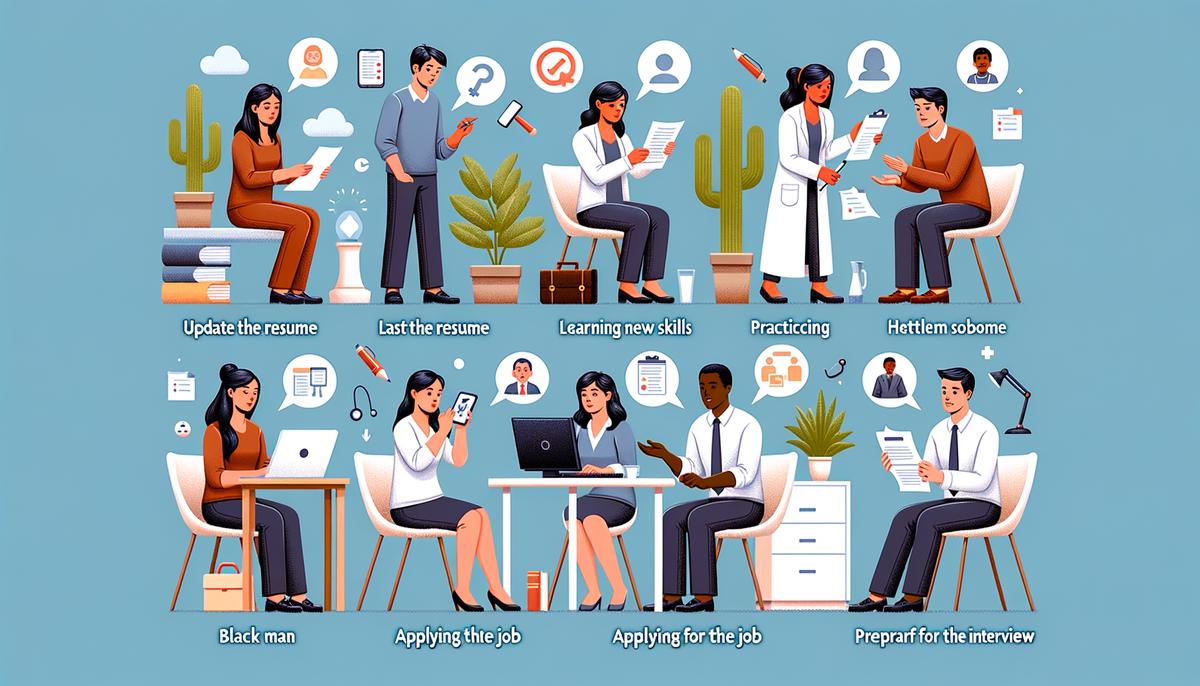Exploring the world of website testing unveils the meticulous work behind the seamless digital experiences we often take for granted. From clicking a link to smoothly navigating through a website’s pages, each step represents a series of tests designed to ensure functionality, performance, and security across various platforms and devices. As the digital landscape continues to evolve, the demand for skilled website testers has surged, marking an exciting era for professionals adept in analyzing and enhancing the digital interface between businesses and their audiences. This essay delves into the essence of website testing, the skill set required to excel in this field, strategies for securing jobs, navigating the challenges, and a glimpse into the future of website testing careers.
Understanding Website Testing
Website Testing: Unpacking Its Importance in Today’s Digital World
In the vast realm of the internet, website testing emerges as a critical practice that ensures websites perform at their best. This process delves deep into examining a website’s functionality, usability, and stability across different browsers and devices. It’s like running a thorough health check-up but for websites.
At its core, website testing involves a series of checks and simulations. These include making sure all the buttons work, links lead where they’re supposed to, and the website looks good whether you’re viewing it on a computer, a tablet, or a smartphone. Imagine typing out a web address and being met with a broken page or a link that leads nowhere – frustrating, right? Website testing aims to catch these issues before the public does.
Why is this endeavor so vital? The digital age has transformed how we interact, shop, and seek information. A website is often the first point of contact between a business and a potential customer. If this encounter is less than stellar, chances are, that customer may never return. In essence, a well-tested website fosters trust, supports seamless user experience, and lays the foundation for successful digital engagements.
Moreover, website testing isn’t a one-off task. As technology evolves and customer expectations shift, websites must adapt. What worked a year ago might not hold up today. Regular testing ensures a website remains relevant, secure, and accessible to all users.
Performance testing is another crucial aspect. This ensures your website can handle high traffic without crashing. Imagine launching a new product, only for your site to go down because too many people are trying to view it at the same time. Regular performance checks can help avoid such pitfalls.
Security testing is the unsung hero of website testing. In an era where cyber threats loom large, ensuring your website is a safe space for users is paramount. This involves probing for vulnerabilities that could be exploited by hackers and fixing them promptly. A secure website protects not just your business, but your users’ sensitive information as well.
In a nutshell, website testing is non-negotiable in crafting digital experiences that are not only enjoyable but safe and reliable. It’s a comprehensive approach that looks at a website from every angle, making sure it’s built on a solid foundation ready to meet the demands of the online world. Whether you’re a small local business or a sprawling global enterprise, ignoring website testing is akin to setting sail in stormy seas without a compass – risky and ill-advised. Keeping your website in top shape ensures it remains an effective, engaging, and secure platform for connecting with the digital populace.

The Skills Required for Website Testing Jobs
Delving into the nuanced sphere of website testing reveals a landscape where certain skills distinctly elevate professionals above the rest. In a domain where precision meets creativity, these skill sets not only enhance efficiency but also ensure that websites deliver an unmatched user experience.
Critical Thinking and Analytical Skills:
At the heart of successful website testing lies the ability to critically evaluate web functionalities beyond surface level. Testers must dissect complex scenarios to foresee potential user actions, ensuring the website is robust against unpredictable interactions. This analytic prowess supports the identification of not just obvious flaws but also uncovers the subtle, often overlooked issues that could impair user satisfaction.
Technical Proficiency and Adaptability:
With the digital domain perpetually evolving, mastery over current programming languages (such as HTML, JavaScript, and CSS) sets a tester apart. Yet, the true mark of expertise is adaptability – the capacity to swiftly navigate through emerging technologies and programming updates. This skill ensures testers can efficiently deal with new tools and frameworks, keeping the websites they work on at the forefront of innovation.
Attention to Detail:
In website testing, the devil is indeed in the details. A keen eye can spot minor discrepancies that could lead to major functional or aesthetic issues, affecting the overall user experience. This meticulous scrutiny extends from typography and layout to interactive elements and load times, ensuring every facet of the website aligns with the intended design and functionality.
Effective Communication:
The ability to articulate findings clearly and succinctly cannot be overstated. Whether it’s drafting comprehensive bug reports or conveying test results to non-technical stakeholders, effective communication ensures that actionable insights are derived from testing efforts. This skill is crucial in facilitating a collaborative environment where developers, designers, and project managers work cohesively towards refining the website.
Empathy and User-Centric Thinking:
Positioning oneself in the shoes of various users enables testers to gauge the inclusivity and accessibility of a website. This empathetic approach ensures that websites are not only functional but also intuitive and welcoming to a diverse audience. A tester’s propensity to advocate for user-friendly designs and features significantly contributes to creating more engaging and accessible digital spaces.
Creative Problem-Solving:
Encountering roadblocks during testing is inevitable. However, possessing a creative mindset allows testers to approach these challenges with innovative solutions. Whether it’s devising unconventional test cases or brainstorming ways to simulate user behavior, creativity fuels a proactive problem-solving attitude that is invaluable in navigating the complexities of website testing.
Time Management and Prioritization:
With the vast array of testing dimensions, including but not limited to load, functionality, and security testing, the ability to prioritize tasks is key. Adept time management ensures that critical issues are addressed promptly, and resources are allocated efficiently, supporting the timely launch of websites that are both robust and user-friendly.
Integrating these skills into one’s repertoire not only catapults a website tester’s career but also significantly elevates the quality of digital experiences they curate. In the dynamic arena of website development, these competencies serve as the cornerstone of success, ensuring that websites not only function flawlessly but also resonate with and exceed user expectations.

Finding and Securing Website Testing Jobs
Landing your first or next website testing job can seem challenging, especially if you’re not sure where to start. Here’s a guide to put you on the right path, whether you’re just starting or aiming for your next big opportunity in website testing.
Building a Strong Foundation
First, focus on enhancing your resume with relevant qualifications and experience. If you’re new to the field, consider enrolling in courses that cover web development basics, software testing principles, and the latest web technologies. For those who already have some experience, advanced certifications in software testing or specific tools can make your resume stand out.
Create a Portfolio
Developing a portfolio is crucial. Start by working on personal projects or contributing to open-source projects. Showcase examples where you’ve identified and solved web usability issues. Include detailed case studies to demonstrate your problem-solving process and the impact of your work. This not only illustrates your practical skills but also your ability to think critically and empathetically from a user’s perspective.
Networking
Networking plays a significant role. Connect with professionals in the field through social media platforms like LinkedIn, attend industry meetups, and participate in webinars or forums related to web development and testing. Engaging with the community can lead to valuable advice, mentorship, and job opportunities.
Leverage Job Boards and Company Websites
Keep an eye on job boards and company websites for openings in website testing. Tailor your resume and cover letter for each application to highlight your skills and experience that match the job requirements. Remember, companies appreciate candidates who show a genuine interest in their mission and understand the specific challenges they face.
Prepare for Interviews
Once you land an interview, preparation is key. Be ready to discuss your experience, process, and how you’ve overcome testing challenges in the past. Practice explaining technical concepts in simple terms, demonstrating your communication skills. Employers often value the ability to articulate complex ideas clearly and effectively.
Continuous Learning
The digital world evolves rapidly, and staying updated with the latest trends, tools, and technologies in web development and testing is essential. Whether through online tutorials, workshops, or industry conferences, continuous learning will help you stay competitive and bring fresh ideas to your role.
By following these steps, you can significantly increase your chances of landing your first or next website testing job. Remember, the field of website testing requires not only technical skills but also a keen eye for detail, an empathetic approach to user experience, and a commitment to continuous improvement. With the right preparation and mindset, you’re well on your way to a successful career in website testing.

Navigating Challenges in Website Testing
One of the biggest challenges in website testing is ensuring cross-browser and cross-device compatibility. Today’s digital landscape features a wide array of browsers like Chrome, Safari, and Firefox, and devices including smartphones, tablets, and laptops, each with different screen sizes and operating systems. This diversity can cause websites to display or behave differently from one environment to another, potentially alienating users if not properly tested.
To tackle this issue, developers use responsive design principles and employ automated testing tools that simulate various browsers and devices. This approach helps identify glitches or inconsistencies early on. It’s also crucial to prioritize testing on browsers and devices most commonly used by the target audience, based on analytics data, to make the process more efficient.
Another significant hurdle is load testing. As websites gain traffic, the sudden influx of users can strain servers, leading to slow load times or even crashes. This can be particularly detrimental during high-traffic events like product launches or sales. By employing load testing, developers can simulate high levels of traffic to gauge a site’s performance and scalability. This enables them to make necessary adjustments to infrastructure and code to handle traffic spikes smoothly.
Security poses an ever-present challenge, with threats evolving rapidly. Websites not only need to protect their own data but also safeguard users’ personal information from breaches. Regular security assessments, including vulnerability scanning and penetration testing, are fundamental. Adhering to best practices for web development, such as secure coding standards and regular software updates, helps fortify a website’s defenses.
Accessibility testing is another vital aspect often overlooked. It ensures that websites are usable by people with disabilities, including those who rely on assistive technologies like screen readers. This involves checking compliance with standards such as the Web Content Accessibility Guidelines (WCAG). Making websites accessible expands the potential user base and demonstrates a commitment to inclusivity.
Finally, the pace of technological change presents its own challenge. New web technologies, frameworks, and best practices emerge continuously, making it essential for developers and testers to stay updated. Participating in online forums, following industry leaders on social media, and attending relevant conferences can help keep skills sharp and ensure that testing strategies remain effective against the backdrop of rapid innovation.
Overcoming these challenges requires a combination of advanced tools, ongoing education, and a proactive approach to testing. By staying ahead of emerging issues and adapting testing processes accordingly, developers can ensure that websites deliver a stellar user experience, regardless of the device or browser, under any traffic conditions, and for users from all walks of life.

The Future of Website Testing Jobs
With the digital landscape growing more complex and the need for seamless online experiences at an all-time high, the future for website testing professionals appears both demanding and promising. To stay ahead, professionals in this field must evolve, keeping pace with emerging trends and technologies. The industry’s trajectory points towards an increased reliance on automation, a greater focus on user experience (UX), and a heightened sensitivity to privacy and security concerns.
Automation is set to play a pivotal role in the future of website testing. As websites become more intricate, manual testing alone is no longer viable for thorough and efficient quality assurance. Tools that automate the testing process can save time and resources, allowing testers to focus on more complex and nuanced aspects of the website experience. Familiarity with and mastery over these tools will be non-negotiable skills for aspiring website testers.
User experience testing is another critical area that will reshape the profession. With businesses recognizing the direct link between user satisfaction and profitability, testing will need to extend beyond finding bugs. Professionals will be tasked with thinking like their end-users, employing empathy to anticipate needs and preferences. This shift towards a more holistic view of website functionality and its impact on the user journey demands a blend of analytical thinking and creative problem-solving skills.
Privacy and security testing will become paramount in an era where data breaches and cyber threats are increasingly common. Website testing professionals must be adept at conducting rigorous security assessments, identifying vulnerabilities, and recommending enhancements to safeguard user information. Understanding the legal and ethical implications of data handling will also be essential, as compliance with regulations like GDPR becomes a standard part of the development and testing process.
Moreover, the integration of new technologies such as artificial intelligence (AI) and the Internet of Things (IoT) into web development introduces both opportunities and challenges for testers. AI can automate complex testing scenarios and predict outcomes, but it also requires testers to refine their approach to testing, ensuring AI-driven features function correctly and meet user needs. Meanwhile, IoT brings a diversity of devices and user contexts into play, complicating the testing process but also enriching the web experience.
Accessibility remains a critical focus, as the internet moves towards inclusivity. Website testing professionals must ensure that web content is accessible to people with disabilities, adhering to international standards and contributing to a more inclusive digital world. This entails a comprehensive understanding of accessibility guidelines and a commitment to implementing them in every project.
In conclusion, the future for website testing professionals is one of growth and transformation. As the canvas of web development expands, so too does the scope of testing. Success in this evolving field will require a mix of technical knowledge, adaptability, and a forward-thinking mindset. By embracing automation, focusing on user experience, prioritizing security and privacy, incorporating new technologies, and championing accessibility, website testing professionals can navigate the future confidently, making invaluable contributions to the digital age.

As we venture into the future of digital landscapes, website testing remains an indispensable part of creating engaging and user-friendly online experiences. The evolution of technology, including the advent of AI and machine learning, signals a transformative phase for website testing, emphasizing the crucial role of continuous learning and adaptability. For professionals in this field, the horizon is broad with opportunities, challenging yet rewarding, as they work on the frontlines of technological innovation to ensure that websites meet the ever-growing standards of quality and excellence.




